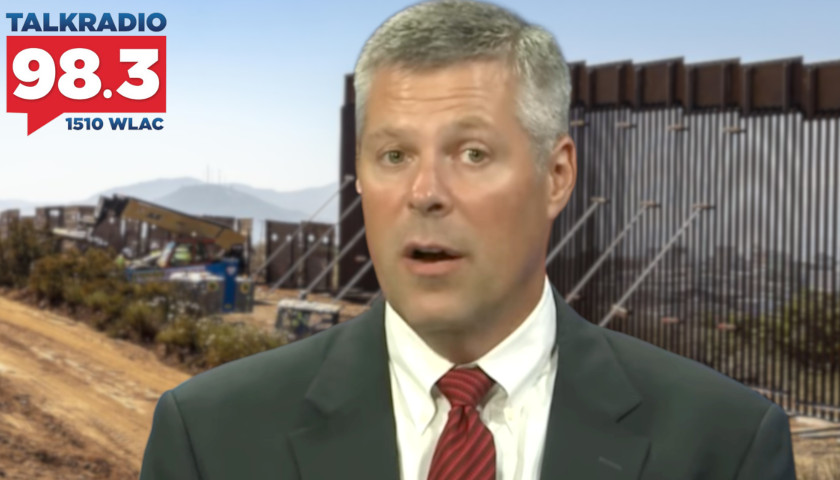Live from Washington, D.C., Thursday morning on The Tennessee Star Report with Michael Patrick Leahy – broadcast on Nashville’s Talk Radio 98.3 and 1510 WLAC weekdays from 5:00 a.m. to 8:00 a.m. – host Leahy welcomed Numbers USA Deputy Director Chris Chmielenski to the microphone to explain their mission and the Remain in Mexico policy.
Leahy: We welcome to our microphones, Chris Chmielenski, the director of Content and Activism for Numbers USA. Good morning, Chris.
Chmielenski: Good morning.
Leahy: Bright-eyed and bushy-tailed here in the old dark 100 in Washington, D.C. Tell us about Numbers USA and tell us what you do as director of content and activism.
Chmielenski: Sure. Actually, I’m our deputy director. So you might have a little bit of an older bio there. But we’re the nation’s largest grassroots immigration reduction organization. We’ve got members, about 8 million activists across the country that are part of our social network, that we keep them up to date on what’s going on in Congress on the immigration issues and provide them some opportunities so they can reach out to their members of Congress and have their voice heard on this very important issue.
Leahy: Why does it matter to keep people up to date on what’s going on in Congress when the Biden maladministration, legal but not legitimate, is violating virtually every immigration law in America today?
Chmielenski: For one reason, that one right there. We’ve got a massive border crisis happening along the border. People started to pay a little bit of attention in April once those numbers crossed the 150,000 mark on a monthly basis.
Leahy: On a monthly basis.
Chmielenski: And that’s Border Patrol apprehensions. But really, this thing dates back to the election. You could see the trends if you look at the fiscal year 2020 after we had a little bit of a surge in 2019. But nothing like what we’re experiencing now.
Leahy: Not even close.
Chmielenski: The Trump administration put in some tough policies. The Remain in Mexico policy and the Zero Tolerance policy.
Leahy: Explain the remain in Mexico policy.
Chmielenski: Sure. What this basically is the way that our asylum system works, and this is oversimplifying it. But to oversimplify, it’s a two-step process. You get into the country whether you come here legally or illegally and you claim asylum. And the first part of the first step to claiming asylum is you enter a credible fear claim.
You basically say I have a fear that there will be harm to me because of my political beliefs, religious beliefs, and a variety of reasons if you send me back to my home country. So you can’t do that. I want to stay here in the United States. It’s a very, very low threshold.
Leahy: Somebody said something mean to me on the bus five years ago.
Chmielenski: That’s pretty much what we’ve reduced credible fear too. If you have that credible fear, you’re allowed to stay here. And in many cases, you get a work permit.
Actually, in most cases, you get a work permit, and then you’re given a date to appear before an immigration judge to argue your case and why you deserve asylum.
Leahy: What happens if you don’t appear before that judge?
Chmielenski: Nothing. About 80 percent of them don’t show up for their immigration hearings. And an important note is these immigration hearings because we’ve so backlogged the system they are three, four years off in the future.
So in that time, from when you claim incredible fear and you cross the border illegally, you claim credible fear, you’re released with the work permit. Even if you show up for your court here, you get to stay here for three years pretty much without fear of deportation.
Leahy: Before we get back to the remain in Mexico policy, to get that work permit, do you have to show your vaccination card if you’re an illegal alien?
Chmielenski: Yeah. That would be a no. (Laughter) No.
Leahy: I hear all those Haitians that came across, 12,000 just slipped into the United States and nobody knows where they are.
Chmielenski: But they’re only temporary visitors only. So they don’t have to worry about it, too.
Leahy: I’m guessing they’re now working on their way to work for hospitals in New York state. And there must be an exemption for them from the governor’s vaccination requirement.
Chmielenski: Right. And if you lift in the view, open borders crowd I mean, that’s exactly the case with all these people that are crossing the border.
Leahy: So the Remain in Mexico policy. Biden wants to bring it back. Try it for a second time. What is it?
Chmielenski: What it is is anybody who claims asylum, we’re going to send you back to Mexico, and you have to wait there until your court date, which is three years down the line.
Leahy: Is this anybody or just somebody from Mexico?
Chmielenski: This is everybody.Because actually, most of the folks that are coming up here to claim asylum are coming from Central America.
Leahy: Deputy director of Numbers USA, thanks so much for joining us today.
Chmielenski: Thanks for having me.
– – –
Tune in weekdays from 5:00 – 8:00 a.m. to the Tennessee Star Report with Michael Patrick Leahy on Talk Radio 98.3 FM WLAC 1510. Listen online at iHeart Radio.
Photo “Chris Chmielenski” by One American News Network.





